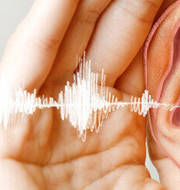
Sudden Hearing Loss (Sudden sensori-neural hearing loss SSNHL)
18 Dec 2020A decline in hearing capability as one ages is a natural phenomenon. People often hear better in one ear as compared to the other. With exposure to environmental pollutants especially a constant noise in today's urban world, the process of age related hearing loss has only hastened over the last couple of decades. Indian cities have metamorphosised from quaint towns to large, noisy over populated metros with a constant din in the background 24x7.
Age related hearing loss or presbyacusis would frequently be encountered in an ENT office in the 6th decade of life a couple of decades ago, however, we see more number of people having hearing loss at an earlier age. The possible causes are multifactorial - Noise pollution, constant use of ear phones, ear pods, head phones by the younger generation, early onset lifestyle ailments like hypertension, diabetes mellitus, viral infections and many more.
But if hearing loss appears suddenly in one ear for no apparent reason, an individual may have experienced sudden sensorineural hearing loss, or SSNHL, a kind of nerve deafness.
The exact incidence is unknown, however, ENT specialists do see a significant number of people seeking help for a sudden hearing loss, however this is more often than not - delayed. The main reason is that people don't view it as a serious problem and don't get the medical care they need. This delay increases the risk of permanent hearing loss.
Unknown causes
The causative factors for sudden hearing loss are unknown, but experts point to several possible reasons: a viral infection, an immune system malfunction, an inflammatory injury to the ear, or blocked blood flow to the ear — or even some combination of these.
This type of sudden hearing loss, can affect people of all age groups, although it tends to occur most in the 50s and 60s. It usually strikes one ear. A person may hear a "pop" or feel like his/her ear is clogged. The hearing often does not go away all at once, It is a gradual decline over several minutes or even hours.
Hearing loss may at times be associated with balance problems for the individual exposing them to a higer risk of fall and injury. A sudden hearing loss can be a manifestation of a stroke or a tumor in a small percentage of people [4 in 1000]. The problem tends to get ignored because the symptoms feel familiar, like a head cold or earwax or water in the ear. People try to treat it with cold or sinus medicine, ear drops, or cleaning their ears. They think it's just an annoying stuffy ear that will go away, so they put it on the back burner until it's too late.
How do we differentiate SSNHL or just a stuffy ear? A Hum can tell
Try this test:
Hum aloud to yourself. With normal hearing, you hear the sound equally in both ears. If you do this when you have a new loss of hearing in one ear, the humming will shift to one side or the other.
For example, if your right ear is affected and the hum is louder in that ear, then the hearing loss is more likely a conductive loss, and probably due to blockage from a cold or built-up ear wax. (You can simulate this effect by humming while you cover your right ear.)
However, if the humming is louder in the left ear, it suggests the right ear hearing loss is due to recent nerve damage, and that requires prompt medical attention.
Treatment and duration
Time is of the essence to save one's hearing. Generally, the earlier the problem is identified and treated, the better the chances of recovery, People have about a week as a window to treat SSNHL; otherwise the hearing loss becomes permanent. So make sure you get your hearing tested and meet an ENT specialist, if your hearing is poorer for longer than a day."
However, even with timely treatment, you may not regain your full hearing. In most cases, mild SSNHL may recover, but people with moderate or severe hearing loss make a total recovery only in about 20% of cases, even with prompt treatment.
SSNHL is treated with corticosteroids over a two- to three-week period. Route of administration can be as a oral pill, IV injection or as an injection into the ear.
Oral steroids are more comfortable to take but can have side effects like an upset stomach, higher blood pressure, mood swings, and insomnia. Injections generally have no systemic side effects, but they can be uncomfortable, and people have to visit their doctor to get them. Some doctors recommend both oral and injected steroids in hopes of increasing the recovery rate.
Remember that if you are used to normal hearing and it suddenly blocks up, that is never okay. "The sooner you get it checked out, the better. If it is SSNHL, every day you delay reduces your chance of recovery.

